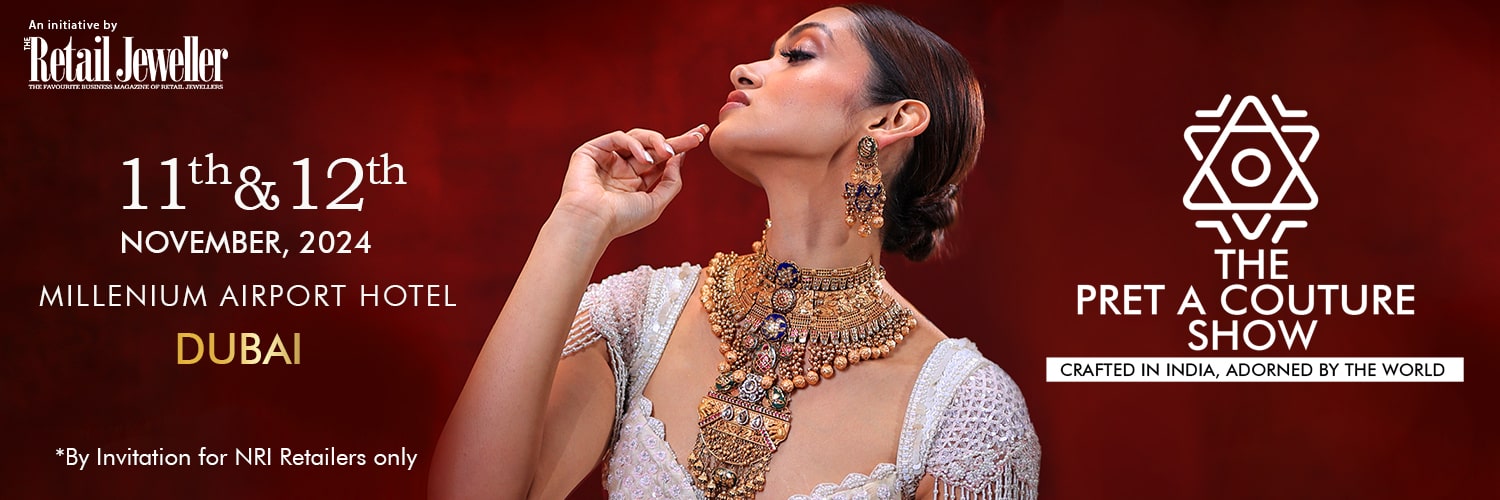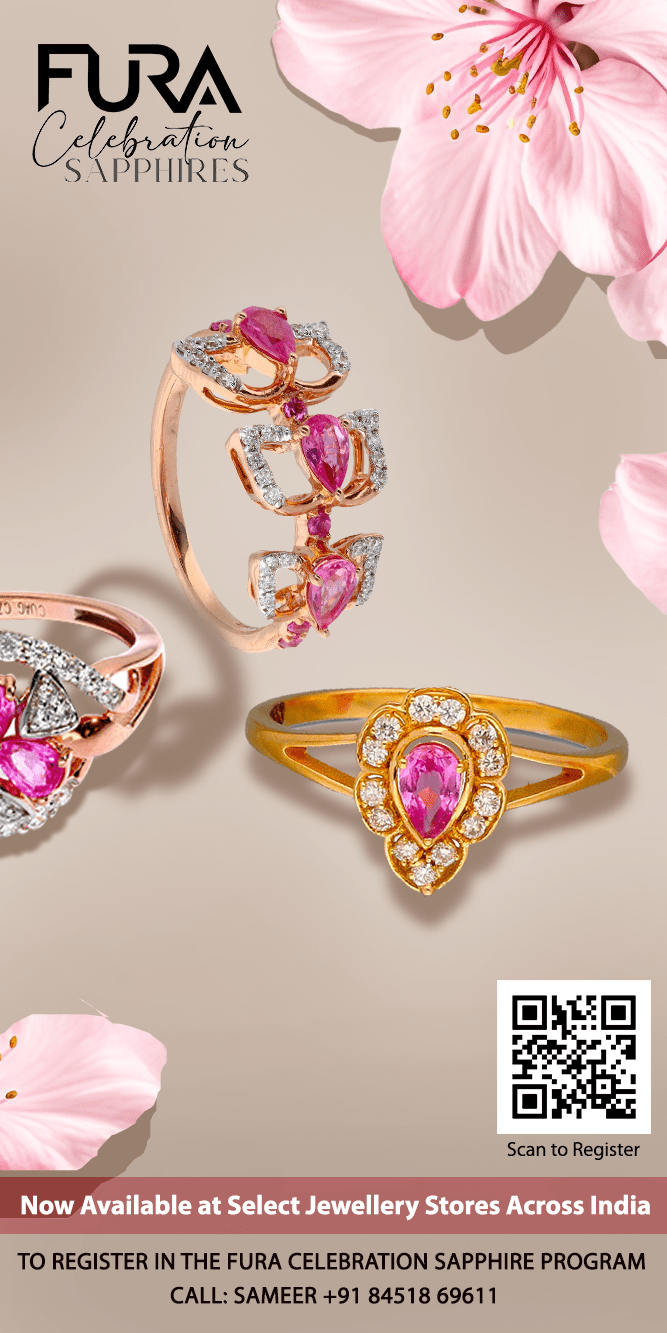Exclusive
De Beers and Tanishq’s groundbreaking alliance initiates a 360-degree approach to tapping into the vast potential of a young nation’s yet unfulfilled diamond dream

Both companies are committed to enhancing trust, transparency, and consumer education with plans to introduce De Beers’ Diamond Proof machine in Tanishq stores in the top 20 towns.
Mumbai: In a landmark collaboration, De Beers, the world-renowned diamond company, and Tanishq, India’s leading jewellery brand, have united to harness the vast potential of the Indian diamond market. This strategic alliance was unveiled at a high-profile event recently where Sandrine Conseiller, CEO of De Beers Brands, and Ajoy Chawla, CEO of the Jewellery Division at Titan Company Limited, outlined their vision for the future of diamonds in India.
De Beers Group, a company with a legacy dating back to 1888, is the world’s largest diamond producer by value. Conseiller focused on India’s pivotal role in the global diamond market, stating, “India is becoming a big heartbeat of this industry.” Her words underscored the country’s remarkable growth, with India now surpassing China as the second-largest diamond market.
Despite its growth, the market still has significant room for penetration. Conseiller emphasised leveraging this potential, positioning India as an “absolute priority” for De Beers. She explained that the collaboration with Tanishq aims to ” drive the diamond industry globally”, using India’s cultural relevance and growing consumer base as a catalyst for further expansion.
Conseiller stressed the importance of this partnership in driving the Indian market forward. “It is not just about simplifying the buying process; it is about harnessing the unique speed and potential of the Indian market. With two excellent companies working together, we can help this market take off at a pace only India can achieve,” she said.
Chawla highlighted India’s expansive market, noting the country’s 1.45 billion population and over 350 million households. Despite these impressive numbers, diamond penetration in India remains relatively low, with only one in ten households owning diamond jewellery.
“India is a gold market by tradition, but diamonds are gaining ground,” Chawla remarked. Chawla also shared insights into Tanishq’s sales. “Last year, Tanishq sold jewellery worth 42,000 crores, plus CaratLane contributed another 3,400 crores. 30 per cent of the total sales comes from diamond-studded jewellery,” he detailed, illustrating the significant role diamonds play in their business.
He emphasised that India is a young nation, and this demographic shift reshapes the jewellery market. Chawla also discussed the challenges of establishing trust and educating consumers about diamond quality. “Most Indian consumers are familiar with gold—it has been passed down through generations. But diamonds are still relatively new, and customers often question the authenticity and quality of diamonds, especially regarding colour and consistency.”
“If a customer does not receive clarity when they visit our store, it will likely deter them,” he explained. The collaboration addresses this issue by enhancing customer confidence through expert guidance.
Chawla also outlined the substantial potential for growth in the diamond market. “On average, we are serving under a million customers a year,” he revealed, adding that “this number could easily double if customers were more confident about buying diamonds”. The partnership’s goal is to achieve this, mainly targeting first-time buyers. This effort includes an extensive customer outreach programme and comprehensive training for Tanishq’s 10,000 customer service executives.
Chawla also acknowledged the growing demand for transparency regarding the origins of diamonds. “Customers want to know where their diamonds come from,” he said. “This is an opportunity for us to collaborate with the best in the world to develop a comprehensive tracking system,” he added.
When quizzed about lab-grown diamonds, Conseiller said, “It is different. It is fashion jewellery, a bit like costume jewellery,” she explained, stressing that these cater to entirely different customer bases. However, as per news reports, De Beers will cease manufacturing lab-grown diamonds for Lightbox in a strategic revamp that will also see it focus on producing industrial diamonds and marketing the unique characteristics of natural diamonds.
In discussing the varying penetration of natural and lab-grown diamonds across markets, Conseiller highlighted the unique characteristics of each region. “In the most developed market, which is the US, we estimate that lab-grown diamonds have around a 30 per cent penetration,” she explained. This trend is less pronounced in India and China, where gold dominates the market. “In terms of value, you need to sell about three lab-grown diamonds to match the margin of one natural diamond.”
Chawla acknowledged the increasing media noise surrounding lab-grown diamonds but downplayed its impact on Tanishq’s operations. “In India, the media noise about lab-grown diamonds has been substantial… But we are not seeing any significant demand for lab-grown diamonds across our 975 stores,” he revealed. He explained that customers often seek clarity on whether the diamonds they purchase are natural, and Tanishq has responded by ensuring transparency and guaranteeing the authenticity of their stones. “Customers are asking for clarity on what is lab-grown and what is natural, and they want confirmation that all our stones are natural,” Chawla added.
Conseiller supported this by discussing De Beers’ ongoing efforts to improve consumer confidence in natural diamonds. “It is essential that consumers understand and know what they are buying,” she said, referring to the introduction of their Diamond Proof machine, a new tool designed to help consumers verify the authenticity of their diamonds. “It is small, user-friendly, and can be used by any consumer,” she noted, highlighting its role in enhancing transparency.
Tanishq and De Beers’ collaboration is set to unfold in multiple phases, each addressing key aspects of the market, technology, and consumer engagement. Chawla outlined the detailed roadmap for this partnership, stating, “Phase 1 marks the beginning of a comprehensive effort to strategically target key markets across India, ensuring that Tanishq and De Beers can deliver a highly localised and impactful customer experience.”
Following the groundwork, Phase 2 will focus on expanding customer outreach. This phase emphasizes creating meaningful connections with customers and leveraging the strengths of both brands to offer unique and desirable products.
The collaboration will also see significant technological advancements and supply chain management alongside these efforts. Chawla shared insights into this aspect: “The other pillar is technology. We will start testing De Beers’ Diamond Proof machine in parallel with the initial phases. We are convinced and aim to roll it out in the top 20 towns as quickly as possible.” This technological innovation, combined with robust supply chain arrangements, is expected to enhance the overall customer experience and offer a new level of trust and transparency in the diamond industry.
In response to thought-provoking questions from The Retail Jeweller on if the Diamond Proof machine was akin to a Karatmeter moment in the gold industry and whether Tanishq would implement similar measures for diamonds across all their stores, Chawla acknowledged the importance of such an initiative and hinted at the possibility, stating, “As the awareness of lab-grown diamonds grows, that may be the way forward. We will first test it out in a few of our stores,” he said, underscoring Tanishq’s cautious yet forward-thinking approach.
As the Indian jewellery market evolves, so do the preferences of its consumers, particularly the younger generation. Chawla and Conseiller both acknowledged the need to adapt to these changing dynamics. “The young customer is a very brand-conscious customer,” Chawla remarked. With rising disposable incomes and an expanding workforce, a growing appetite for branded products exists. “Branded jewellery, and, I am going a step further, branded diamonds as well,” he added. This reflects a shift where consumers seek more than just a product; they seek a brand that offers trust, exceptional design, and the ability to inspire.
Conseiller echoed this sentiment, noting that Gen Z’s attraction to luxury, including diamonds, remains strong, driven by a desire to dream and experience something extraordinary. “The future is not just about viewing diamonds as commodities,” she said. “It is about creating a narrative around them that resonates emotionally with consumers.”
Looking ahead, Tanishq and De Beers aim to redefine the natural diamond market by moving beyond traditional perceptions. Chawla elaborated on this vision: “What creates desire and excitement is brands. Brands offer trust first and then excellent products and designs. They help consumers dream and aspire.” He emphasised that Tanishq Diamonds will set new standards, focusing on trust and desirability rather than merely categorising diamonds as natural or lab-grown.
As Tanishq and De Beers embark on this ambitious journey, they focus on blending tradition with innovation to create a trustworthy and aspirational jewellery experience that resonates deeply with the modern Indian consumer.
Written by Pooja Mujumdar
Retail Jeweller India Exclusive





 Wide Angle1 month ago
Wide Angle1 month agoIndia has overtaken China to become second largest diamond market: De Beers CEO Al Cook

 Daily News1 month ago
Daily News1 month agoUS-based private equity firm Advent International to acquire Orra Fine Jewellery, say media reports

 Wide Angle1 month ago
Wide Angle1 month agoEminent jeweller Viren Bhagat sets up first global boutique in London’s Mayfair

 Daily News1 month ago
Daily News1 month agoLimelight Lab Grown Diamonds secures $ 11 million in funding to fuel its retail growth























